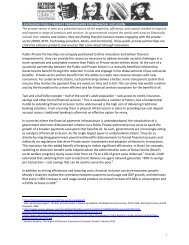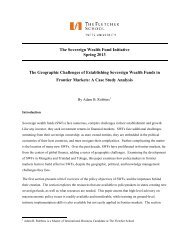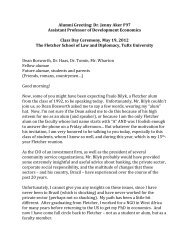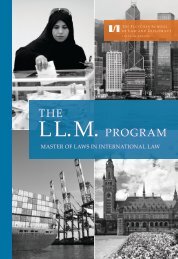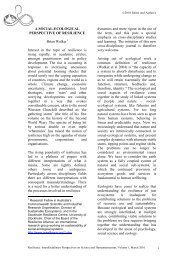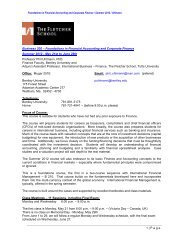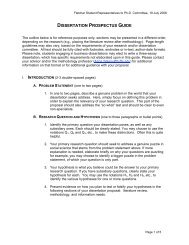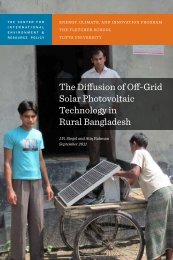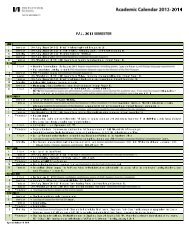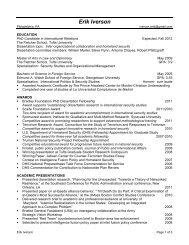Threaten but Participate: - Brookings Institution
Threaten but Participate: - Brookings Institution
Threaten but Participate: - Brookings Institution
You also want an ePaper? Increase the reach of your titles
YUMPU automatically turns print PDFs into web optimized ePapers that Google loves.
interim government oversaw new elections in 2001,and Toledo defeated Alan Garcia to become the newPeruvian president. As with Bangladesh, the boycottwas just one piece of the puzzle; the ability to mobilizestrong anti-governmental support was the keyfactor in the eventual regime change.In 2006, embattled Thai Prime Minister ThaksinShinawatra called for parliamentary elections to beheld within 60 days, three years ahead of schedule,as a way to break a governmental impasse. The opposition,angered that Thaksin was planning to usethese elections as a makeshift referendum, protestedand chose to boycott despite holding 96 of 500seats. Thanks to the boycott, Thaksin’s party won458 seats in the election, <strong>but</strong> as in Bangladesh andPeru, popular support was on the side of the opposition.Massive protests and demonstrations led toThaksin’s decision to step down two days after theelections. The courts then nullified the elections andcalled for new elections to be held under the controlof a caretaker government.But even the Bangladesh and Thailand cases werenot clear-cut victories, as post-boycott events servedto move both countries away from democracy. Inthe Thai case, the military filled the void five monthsafter the nullified elections and took power in abloodless coup. It would be another 15 months beforeany elections were held. The Bangladeshi exampleis more complicated. Awami’s boycott allowed itto take power in 1996, <strong>but</strong> the BNP returned to thethrone in 2002, leading to another standoff aheadof the planned 2007 elections. Returning to their1996 model, Awami organized massive protests andstrikes, <strong>but</strong> this time the military finally stepped in,ruling the country as a “caretaker government” undera state of emergency throughout 2007 and 2008.The second scenario in which boycotts can be effectiveis what I refer to as “quorum boycotts.” In thesecases, the country’s president must be appointedby two-thirds of the legislative body, so oppositioncoalition decisions to boycott these elections canprevent the attainment of a quorum and nullify theelections. The boycotts are successful in these casesbecause they operate under strict constitutionalguidelines. Whereas a president in a general electioncan win a boycotted election even when turnout is25 percent or less, in the quorum cases, the boycottcan bring the proceedings to a standstill.The Moldovan opposition utilized this tactic in 2000to prevent a Communist candidate from earning thepresidency. Four attempts at an election were heldand all four failed due to a lack of quorum. Finally,new parliamentary elections were held in 2001, andthe Communists gained enough seats to push theircandidate through. The opposition tried again in2005, after earning 45 of 101 seats in that year’s parliamentaryelections. Once again, the boycott nullifiedseveral attempts to pick a president, althoughthis time, one of the opposition parties negotiatedwith the Communists to support their candidate inexchange for action on several key laws.There are dangers in this approach as well, despitesome successes. Although taking the obstinatestance can yield benefits in negotiations, the publicmay not have the stomach for extended delaysand obfuscations, especially when there is not astrong anti-incumbent outcry. In these cases, theboycotting party can end up getting burned. Takethe Republican People’s Party (CHP) in Turkey. Asecular party, the CHP objected to Prime MinisterErdogan’s appointment of Islamist Abdullah Gul asa presidential candidate. The CHP’s boycott left theparliament ten votes short of the required numberto elect him, leading to three failed attempts andfinally new parliamentary elections. But, when theelections were held, the CHP took a pounding, fallingfrom 178 seats to 112. Most of the seats werelost to a new nationalist party that then made a dealwith Erdogan’s party to support Gul’s candidacy.ImplicationsThe results of this study hold profound lessons forboth ruling and opposition parties, as well as theinternational community in terms of the decisionmaking surrounding electoral boycotts. From theperspective of the opposition party, it is clear thatelectoral boycotts are rarely the correct strategy, unlessthe opposition has widespread public support andpersistence to remove the ruling regime. In the vast<strong>Threaten</strong> <strong>but</strong> <strong>Participate</strong>: Why Election Boycotts Are a Bad IdeaF o r e i g n P o l i c y a t B r o o k i n g s9



